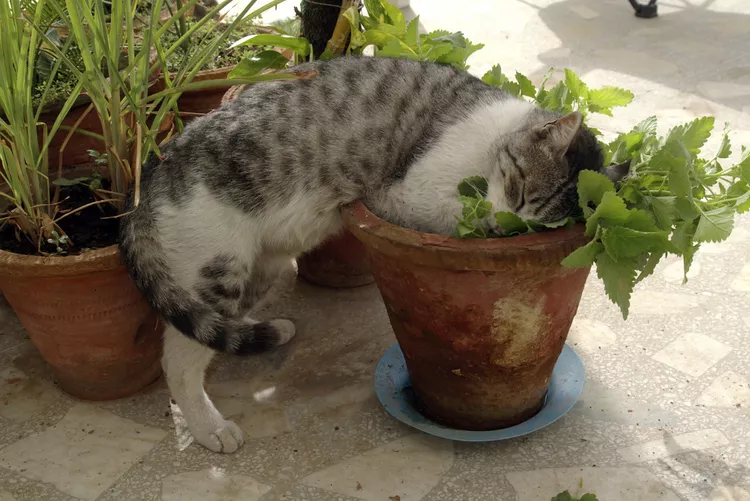Is Catnip Bad for Cats?

Does your cat go crazy for catnip? Many cat lovers wonder if catnip is bad for cats. After all, it does make some cats appear to be "high" or drugged. The truth is that catnip is generally harmless to cats.
What Is Catnip?
Catnip is a leafy green perennial herb belonging to the mint family. Known also by the scientific name Nepeta cataria, catnip contains an oil called nepetalactone that has a euphoric effect on many cats.
Catnip has historically been used by humans as a natural remedy for various ailments. However, there is no scientific evidence to support its efficacy to treat specific ailments.
Catnip is sometimes called catmint, or field balm. This plant is quite easy to grow in many environments, but it may take over a garden if not contained. Catnip can also be grown indoors. If you decide to do so, keep the plant out of your cat's reach or else the whole plant may be nibbled up. While not toxic or harmful, too many leafy greens can upset a cat's stomach.
How Catnip Affects Cats
The nepetalactone in catnip causes most cats to experience euphoria after smelling or ingesting the herb. They typically respond by sniffing the herb, rubbing their heads and faces on it, rolling around, vocalizing, playing, running, scratching, and even eating it. It appears to be a pleasurable reaction that is adjacent to psychosexual stimulation. However, the reaction to catnip is not dependent on the cat's reproductive ability; spayed or neutered cats react equally to the herb.
The effects of catnip typically last up to about 15 minutes. Many cats will nap after the euphoric experience. Some cats will only experience sleepiness and relaxation after catnip exposure rather than excitement and playfulness. It is completely normal for different cats to have unique responses to catnip.
Catnip may even be considered beneficial to some cats. Indoor cats often need extra enrichment to keep them active and content. Catnip can help stimulate cats both mentally and physically, leading to happier, healthier living. Using catnip on cat scratchers can attract them to these areas and discourage destructive scratching.
Not all cats respond to catnip. Some cats do not inherit the traits that make them respond to nepetalactone. Young kittens typically do not respond to catnip. Some will begin to respond as early as six weeks of age, but it could take as long as six to eight months to develop an interest in the herb.
Is Catnip Safe for Cats?
Catnip is non-toxic to cats, even when ingested. The euphoric effects of catnip are short-acting and harmless to cats. Catnip is not addictive and there is no evidence of long-term effects.
Cats may seem like they are "high" after exposure to catnip, a fact that worries come cat lovers. Although we may never know exactly how catnip makes cats feel, there is no evidence that indicates it is harmful or addictive. It is up to you to decide how and when to give your catnip to your cat. Ask your veterinarian for advice if you are uncertain about it.
Catnip itself is perfectly safe for cats, but there are certain situations to avoid. Some catnip-related products, toys, and situations can be dangerous if used improperly.
- Do not let your cat drink catnip-infused tinctures, sprays, or solutions unless they are labeled safe for feline consumption. Some of these are intended for use on toys or bedding only. They may contain alcohol or other ingredients unsuitable for ingestion.
- Avoid catnip toys that have strings or parts that may be eaten by cats and become dangerous gastrointestinal obstructions.
- Use caution when giving catnip to cats with known aggression. It may cause lowered inhibition and lead to an increase in aggressive behavior.
- Avoid giving catnip to sick cats or those recovering from injury or surgery. Some cats become hyperactive on catnip, which could impede recovery.
Warning
How to Give Catnip to Cats
There are several ways you can safely give catnip to your cat. Catnip comes in several forms. It can be grown and dried at home, purchased in dry form, or purchased as a potted plant. Pet supply stores often sell cat toys containing catnip, pressed balls of catnip, and catnip-infused treats, tinctures, and sprays.
Catnip is best enjoyed by cats in small doses as it takes a very small amount to produce effects. In addition, catnip may become less effective on cats if used often.
There are several ways to give your kitty the catnip experience. It can be sprinkled on cat furniture, beds, and scratching pads. You can even "marinate" cat toys in dried catnip. If your cat enjoys munching on plants, try growing a small pot of fresh catnip that you can offer to your cat on occasion.